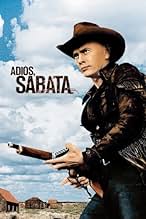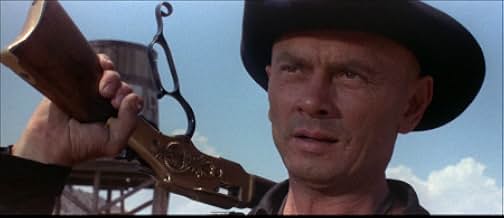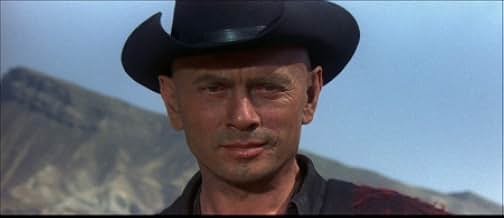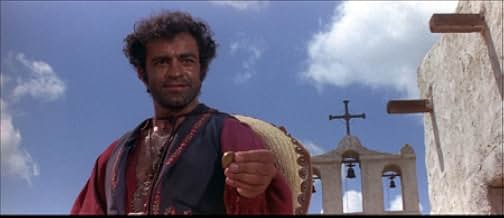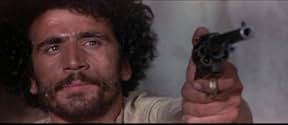IMDb RATING
5.9/10
2.5K
YOUR RATING
Sabata helps a band of Mexican revolutionaries steal a wagon-load of gold from the occupying Austrian forces of Emperor Maximilian I.Sabata helps a band of Mexican revolutionaries steal a wagon-load of gold from the occupying Austrian forces of Emperor Maximilian I.Sabata helps a band of Mexican revolutionaries steal a wagon-load of gold from the occupying Austrian forces of Emperor Maximilian I.
Ignazio Spalla
- Escudo
- (as Pedro Sanchez)
Gérard Herter
- Colonel Skimmel
- (as Gerard Herter)
Turam Quibo
- Gitano
- (as Joseph Persaud)
Nieves Navarro
- Kingsville Saloon Dancer
- (as Susan Scott)
Vittorio Caronia
- 1st Lt. Steiner
- (as Vitti Caronia)
Featured reviews
The film talks about Sabata or Indio Black (Yul Brynner) , a gunfighter dressed in dark buckskin with fringes . He along with a motley group of revolutionary bandits have purports to steal a wagon loaded of gold from a devious Austrian Colonel called Skimmel (Gerard Herter) serving to Emperor Maximiliano during the Mexican Civil War against Benito Juarez . The misfit group is formed by different characters each one with particular ability , as the deaf-mute (Sal Borgese) is an expert thrower of balls , the dancer Gitano or Gypsy (Joseph Persaud) who does a Flamenco dance of death ; besides a fat , ironic Mexican (Pedro Sanchez or Ignacio Spalla acting in similar roles to Spaghetti idol Fernando Sancho) and a cocky , ruddy young man (the singer Dean Reed , early deceased) .
The picture contains Western action , gun-play , comedy , tongue-in-cheek and a little bit of violence . The film gets the comic remarks from Western parody united the features of typical Spaghetti as violent confrontation , ambitious antiheroes , bloody and spectacular showdown with several deaths , quick zooms and extreme baddies . This was not originally a Sabata film , the original Italian title translates as "Indio Black, you know what? You're a big son of a..." . Indio Black being the character played by Yul Brynner , but the title and Brynner's character name were changed for the American release to cash in on Sabata (1969) , the original film . Yul Brynner as a tough gunfighter with technical weaponry (like a Western James Bond) is enjoyable , similarly the previous Sabata : Lee Van Cleef , who was playing the role as 'Chris' in the following to first entry ¨The Seven magnificent¨ whose starring was the famous bald . At the same time Brynner filmed ¨Catlow¨ by Sam Wanamaker also in a lookalike role and similar plot , but it also narrates the robbing a Mexican gold shipment . Gerard Herter as a nasty and cruel Austrian officer with monocle named Colonel Skimmel is magnificent , but he repeats the role who starred in ¨The big gundown¨ (by Sergio Sollima with Lee Van Cleef) also with Nieves Navarro , here playing a very secondary role as a gorgeous saloon dancer . Bruno Nicolai musical score is lively and atmospheric , he's an usual collaborator to Ennio Morricone . The picture was well produced by Albert Grimaldi (¨Trilogy of dollars¨ producer) . The film was professionally directed by Frank Kramer (pseudonym of Gianfranco Parolini) who made the original and best ¨Sabata¨, continuing with ¨The return of Sabata¨ ; besides directing another Spaghetti hero : ¨Sartana¨ with Gianni Garco and Klaus Kinski, and his last Western again with Lee Van Cleef : ¨Diamante Lobo¨ . The flick will appeal to Yul Brynner fans and Spaghetti Western enthusiasts.
The picture contains Western action , gun-play , comedy , tongue-in-cheek and a little bit of violence . The film gets the comic remarks from Western parody united the features of typical Spaghetti as violent confrontation , ambitious antiheroes , bloody and spectacular showdown with several deaths , quick zooms and extreme baddies . This was not originally a Sabata film , the original Italian title translates as "Indio Black, you know what? You're a big son of a..." . Indio Black being the character played by Yul Brynner , but the title and Brynner's character name were changed for the American release to cash in on Sabata (1969) , the original film . Yul Brynner as a tough gunfighter with technical weaponry (like a Western James Bond) is enjoyable , similarly the previous Sabata : Lee Van Cleef , who was playing the role as 'Chris' in the following to first entry ¨The Seven magnificent¨ whose starring was the famous bald . At the same time Brynner filmed ¨Catlow¨ by Sam Wanamaker also in a lookalike role and similar plot , but it also narrates the robbing a Mexican gold shipment . Gerard Herter as a nasty and cruel Austrian officer with monocle named Colonel Skimmel is magnificent , but he repeats the role who starred in ¨The big gundown¨ (by Sergio Sollima with Lee Van Cleef) also with Nieves Navarro , here playing a very secondary role as a gorgeous saloon dancer . Bruno Nicolai musical score is lively and atmospheric , he's an usual collaborator to Ennio Morricone . The picture was well produced by Albert Grimaldi (¨Trilogy of dollars¨ producer) . The film was professionally directed by Frank Kramer (pseudonym of Gianfranco Parolini) who made the original and best ¨Sabata¨, continuing with ¨The return of Sabata¨ ; besides directing another Spaghetti hero : ¨Sartana¨ with Gianni Garco and Klaus Kinski, and his last Western again with Lee Van Cleef : ¨Diamante Lobo¨ . The flick will appeal to Yul Brynner fans and Spaghetti Western enthusiasts.
Yul Brynner and Dean (The Red Elvis) Reed team up with a group of Mexican revolutionaries in order to steal a shipment of gold belonging to the invading Austrian army and use it to buy guns for the resistance. However, the vicious Austrian occupiers have a few tricks up their sleeves and so does Brynner.
Yul's only real spaghetti western, his performance, flamboyant outfit, and neat gun-play elevates this very much typical, though well-made production to a higher level than it otherwise would have been. It's still too bland though.
The score by frequent Ennio Morricone collaborator Bruno Nicolai is pretty good.
From the producers and director of the earlier Sabata, this similarly themed film only became a sequel in the dubbing booth.
Yul's only real spaghetti western, his performance, flamboyant outfit, and neat gun-play elevates this very much typical, though well-made production to a higher level than it otherwise would have been. It's still too bland though.
The score by frequent Ennio Morricone collaborator Bruno Nicolai is pretty good.
From the producers and director of the earlier Sabata, this similarly themed film only became a sequel in the dubbing booth.
The manic westerns of Gianfranco Parolini are like surreal comic books with outrageous editing and angles, bizarre weaponry, confusing language, episodic plots where every scene has a punchline, and ridiculous costumes. His films have a sense of tongue in cheek fun that comes through clearly thirty years later. It appears that the circus was his model, unpretentious entertainment pure and simple. There is absolutely no serious intention in his movies. That is why he remains the guilty pleasure of a number of fans of spaghetti westerns and eurotrash films in general. Along with Sabata (1970), Adios, Sabata is one of his "best".
The score by Bruno Nicolai is excellent, though reminiscent of Morricone's scores for the first 2 Leone movies.
The movie was originally intended be about a character called Indio Black, but with the success of Sabata the names were changed.
The five best things about this film: 1)Yul Brynner's black outfit with leather trim, an open vest, and bell bottoms 2)Lines like (spoken by Brynner), "Now let's get moving. Every Austrian in the territory will be looking for us." 3)The devious Colonel Skimmel 4)Every Austrian wears a black suit, tie, and bowler hat, making them somewhat conspicuous 5)The cast of revolutionary characters each with a unique ability or weapon
Top spaghetti western list http://imdb.com/mymovies/list?l=21849907
Average SWs http://imdb.com/mymovies/list?l=21849889
For fanatics only (bottom of the barrel) http://imdb.com/mymovies/list?l=21849890
The score by Bruno Nicolai is excellent, though reminiscent of Morricone's scores for the first 2 Leone movies.
The movie was originally intended be about a character called Indio Black, but with the success of Sabata the names were changed.
The five best things about this film: 1)Yul Brynner's black outfit with leather trim, an open vest, and bell bottoms 2)Lines like (spoken by Brynner), "Now let's get moving. Every Austrian in the territory will be looking for us." 3)The devious Colonel Skimmel 4)Every Austrian wears a black suit, tie, and bowler hat, making them somewhat conspicuous 5)The cast of revolutionary characters each with a unique ability or weapon
Top spaghetti western list http://imdb.com/mymovies/list?l=21849907
Average SWs http://imdb.com/mymovies/list?l=21849889
For fanatics only (bottom of the barrel) http://imdb.com/mymovies/list?l=21849890
In his one and only venture into the pasta western, Yul Brynner finds himself succeeding Lee Van Cleef as the mysterious gunfighter Sabata who gets himself involved in Mexican politics in trying to overthrow the Emperor Maximilian. There hasn't been a film yet where the Juaristas aren't the good guys, even in Juarez where Brian Aherne made a sympathetic if somewhat naive Maximilian. It's such a clear case of imperialism.
But Yul isn't a total good guy and he teams up with three partners to steal a shipment of gold from the occupiers and give it to the Juaristas ostensibly. Actually the four of them are only as good as they have to be. And they've got another along, an American played by the only American actor in Adios Sabata, Dean Reed, who has an agenda all his own who keeps a positively explosive diary.
As most of us know even those who get their history from films, the Emperor Maximilian was an Austrian, but who was put on the newly created Mexican throne by the French and sustained by the French army. But here we have Austrian occupiers including an Austrian commander who also has a private agenda. I'm betting the producers were thinking that German types make so much better villains than the French.
Sabata's distinguishing characteristic was a rife that he had a long holster for and drew like a revolver. This rife had a unique horizontal magazine from where the bullets came. But the last chamber always had a cigar which Yul would light up after a killing well done.
I'm not a fan of spaghetti westerns and don't usually give them good reviews. It's the American genre and should be done by Americans. This one is no exception. But I will say that Yul Brynner's cynical look throughout the film is quite priceless.
But Yul isn't a total good guy and he teams up with three partners to steal a shipment of gold from the occupiers and give it to the Juaristas ostensibly. Actually the four of them are only as good as they have to be. And they've got another along, an American played by the only American actor in Adios Sabata, Dean Reed, who has an agenda all his own who keeps a positively explosive diary.
As most of us know even those who get their history from films, the Emperor Maximilian was an Austrian, but who was put on the newly created Mexican throne by the French and sustained by the French army. But here we have Austrian occupiers including an Austrian commander who also has a private agenda. I'm betting the producers were thinking that German types make so much better villains than the French.
Sabata's distinguishing characteristic was a rife that he had a long holster for and drew like a revolver. This rife had a unique horizontal magazine from where the bullets came. But the last chamber always had a cigar which Yul would light up after a killing well done.
I'm not a fan of spaghetti westerns and don't usually give them good reviews. It's the American genre and should be done by Americans. This one is no exception. But I will say that Yul Brynner's cynical look throughout the film is quite priceless.
Firstly, this is *not* a sequel to 1970's "Sabata" ("Ehi amico... c'è Sabata, hai chiuso!") although it can be considered a follow up of sorts. Lee Van Cleef did not reprise the role until 1971's "Return of Sabata". "Adiós Sabata" was originally about a character called Indio Black and completely unrelated to the previous Sabata story - Indio, I believe, was meant to be nothing more than a bandit. The name was changed to cash in on the success of "Sabata" - though this film could be considered a true Sabata entry as a couple of stars return (Pedro Sanchez, Gianni Rizzo) and the screenwriters and director are the same. Gianfranco Parolini (Frank Kramer) perhaps out does the previous film here, keeping everything tighter - "Sabata" was a little too jokey (although still excellent and one of the truly great Italian westerns) whereas this is blatantly tongue in cheek. I feel the music is better in this film, never intrusive and always fitting: a triumph for Bruno Nicolai, despite the fact that it is incredibly reminiscent of Morricone.
As Sabata, Brynner is a kind of anti-hero counterpart to Chris from "The Magnificent Seven"; he even dresses out all in black here too. Gérard Herter is great as the Austrian Colonel Skimmel at the time of Emperor Maximillian's Mexico - a kind of borderline camp, Bond villain type, complete with monacle and perfectly trimmed moustache. Oh, and yes, he is a dead shot with a rifle. In "Sabata", Franco Ressel's Stengel had his shootout's behind man shaped shields (to live at the peak of danger or some such nonsense) as his playtoy; Herter's Skimmel has an even better one - a drawer beneath a model ship that when opened fires each cannon on the model directly into whoever opens the drawer. Like "The Good, the Bad and the Ugly" (which this film contains some surprisingly subtle references to) the plot centres around a shipment of gold: Sabata, Escudo (Sanchez) and Ballantine (Dean Reed) want the wagon load of gold, but it is also coveted by Maximillian's rebels. The scenes with the gold and the gold dust being poured out/spilled is nicely complimented by Nicolai's incidental music which really does bring out the joy of the characters.
I personally think it's a shame that Brynner and the others weren't brought back for another Sabata film because he plays the role much straighter than Van Cleef did and really does come across as a tough guy here, who doesn't need to rely on his gun. "Adiós Sabata" is a classic in it's own right and doesn't need to be viewed with the other Sabata entries. It's only downside is that after surpassing the superb original, it left most people disappointed with the later "Return of Sabata".
Are these subtle hints to Leone's 1966 masterpiece? Sanchez: "Me, I'd make a hiding place no-one would find - stick it in the ground, maybe in a cemetery..." Reed (the last line): "Hey fellas - are you gonna help me pick up the gold or not, you sons of...!" (music takes over)
As Sabata, Brynner is a kind of anti-hero counterpart to Chris from "The Magnificent Seven"; he even dresses out all in black here too. Gérard Herter is great as the Austrian Colonel Skimmel at the time of Emperor Maximillian's Mexico - a kind of borderline camp, Bond villain type, complete with monacle and perfectly trimmed moustache. Oh, and yes, he is a dead shot with a rifle. In "Sabata", Franco Ressel's Stengel had his shootout's behind man shaped shields (to live at the peak of danger or some such nonsense) as his playtoy; Herter's Skimmel has an even better one - a drawer beneath a model ship that when opened fires each cannon on the model directly into whoever opens the drawer. Like "The Good, the Bad and the Ugly" (which this film contains some surprisingly subtle references to) the plot centres around a shipment of gold: Sabata, Escudo (Sanchez) and Ballantine (Dean Reed) want the wagon load of gold, but it is also coveted by Maximillian's rebels. The scenes with the gold and the gold dust being poured out/spilled is nicely complimented by Nicolai's incidental music which really does bring out the joy of the characters.
I personally think it's a shame that Brynner and the others weren't brought back for another Sabata film because he plays the role much straighter than Van Cleef did and really does come across as a tough guy here, who doesn't need to rely on his gun. "Adiós Sabata" is a classic in it's own right and doesn't need to be viewed with the other Sabata entries. It's only downside is that after surpassing the superb original, it left most people disappointed with the later "Return of Sabata".
Are these subtle hints to Leone's 1966 masterpiece? Sanchez: "Me, I'd make a hiding place no-one would find - stick it in the ground, maybe in a cemetery..." Reed (the last line): "Hey fellas - are you gonna help me pick up the gold or not, you sons of...!" (music takes over)
Did you know
- TriviaThis was not originally a Sabata film. The original Italian title translates as "Indio Black, you know what? You're a big son of a...", Indio Black being the character played by Yul Brynner, but the title and Brynner's character name were changed for the American release to cash in on Sabata (1969), the original Sabata film. Lee Van Cleef was asked to star in this film, but rejected the offer for some reason. He was then replaced by Brynner, whose character would only be called Sabata in the international English language version, and Indio Black in the Italian version. However, lip reading viewers have noticed that the actors who mouth their lines in English, seem to say "Sabata", not "Indio", so the re-baptism took place while the film was still being shot.
- GoofsWhen Sabata invades Colonel Skimmel's quarters, he sees the reflection of a person hiding behind the door. The person in the reflection is not Hertz.
- ConnectionsEdited into Spaghetti Western Trailer Show (2007)
- How long is Adiós, Sabata?Powered by Alexa
- What type of weapon did Yul use in this movie?
Details
Box office
- Gross US & Canada
- $546,926
- Runtime1 hour 44 minutes
- Aspect ratio
- 2.35 : 1
Contribute to this page
Suggest an edit or add missing content



